Related Research Articles

The Troubles were an ethno-nationalist conflict in Northern Ireland that lasted about 30 years from the late 1960s to 1998. Also known internationally as the Northern Ireland conflict, it is sometimes described as an "irregular war" or "low-level war". The conflict began in the late 1960s and is usually deemed to have ended with the Good Friday Agreement of 1998. Although the Troubles mostly took place in Northern Ireland, at times violence spilled over into parts of the Republic of Ireland, England and mainland Europe.
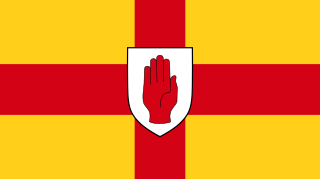
Ulster is one of the four traditional Irish provinces, in the north of Ireland. It is made up of nine counties: six of these constitute Northern Ireland ; the remaining three are in the Republic of Ireland.

The Ulster Volunteer Force (UVF) is an Ulster loyalist terrorist group. Formed in 1965, it first emerged in 1966. Its first leader was Gusty Spence, a former British Army soldier from Northern Ireland. The group undertook an armed campaign of almost thirty years during The Troubles. It declared a ceasefire in 1994 and officially ended its campaign in 2007, although some of its members have continued to engage in violence and criminal activities. The group is classified as a terrorist organisation by the United Kingdom and Republic of Ireland.
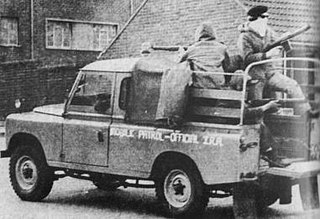
The Official Irish Republican Army or Official IRA was an Irish republican paramilitary group whose goal was to remove Northern Ireland from the United Kingdom and create a "workers' republic" encompassing all of Ireland. It emerged in December 1969, shortly after the beginning of the Troubles, when the Irish Republican Army (IRA) split into two factions. The other was the Provisional IRA. Each continued to call itself simply "the IRA" and rejected the other's legitimacy. Unlike the "Provisionals", the "Officials" did not think that Ireland could be unified until the Protestant majority of Northern Ireland and Catholic minority of Northern Ireland were at peace with each other. The Officials were Marxist-Leninists and worked to form a united front with other Irish communist groups, named the Irish National Liberation Front (NLF). The Officials were called the NLF by the Provisionals, the "stickies" by West Belfast locals, and were sometimes nicknamed the Red IRA by others.

The Irish War of Independence or Anglo-Irish War was a guerrilla war fought in Ireland from 1919 to 1921 between the Irish Republican Army and British forces: the British Army, along with the quasi-military Royal Irish Constabulary (RIC) and its paramilitary forces the Auxiliaries and Ulster Special Constabulary (USC). It was part of the Irish revolutionary period.

Terence Marne O'Neill, Baron O'Neill of the Maine, PC (NI), was the fourth prime minister of Northern Ireland and leader (1963–1969) of the Ulster Unionist Party (UUP). A moderate unionist, who sought to reconcile the sectarian divisions in Northern Ireland society, he was a member of the Parliament of Northern Ireland for the Bannside constituency from 1946 until his resignation in January 1970; his successor in the House of Commons of Northern Ireland was Ian Paisley, while control of the UUP also passed to more hard-line elements.
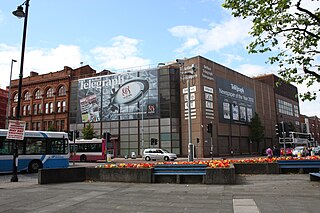
The Belfast Telegraph is a daily newspaper published in Belfast, Northern Ireland, by Independent News & Media. Its editor is Eoin Brannigan. Reflecting its unionist tradition, the paper has historically been "favoured by the Protestant population", while also being read within Catholic nationalist communities in Northern Ireland.

Antrim is a town and civil parish in County Antrim in the northeast of Northern Ireland, on the banks of the Six Mile Water, on the north shore of Lough Neagh. It had a population of 23,375 people in the 2011 Census. It is the county town of County Antrim and was the administrative centre of Antrim Borough Council. It is 22 miles (35 km) northwest of Belfast by rail.
The Bogside is a neighbourhood outside the city walls of Derry, Northern Ireland. The large gable-wall murals by the Bogside Artists, Free Derry Corner and the Gasyard Féile are popular tourist attractions. The Bogside is a majority Catholic/Irish republican area, and shares a border with the Protestant/Ulster loyalist enclave of the Fountain.

The Twelfth is an Ulster Protestant celebration held on 12 July. It began in the late 18th century in Ulster. It celebrates the Glorious Revolution (1688) and victory of Protestant King William of Orange over Catholic King James II at the Battle of the Boyne (1690), which ensured a Protestant Ascendancy in Ireland. On and around the Twelfth, large parades are held by the Orange Order and Ulster loyalist marching bands, streets are bedecked with British flags and bunting, and large towering bonfires are lit in loyalist neighbourhoods. Today the Twelfth is mainly celebrated in Northern Ireland, where it is a public holiday, but smaller celebrations are held in other countries where Orange lodges have been set up.
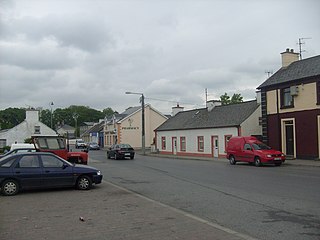
Convoy is a village in the east of County Donegal, Ireland, in the Finn Valley district. It is part of the Barony of Raphoe South. It is situated on the Burn Dale, and is located on the R236 road to Raphoe.
The Northern Ireland Civil Rights Association (NICRA) was an organisation that campaigned for civil rights in Northern Ireland during the late 1960s and early 1970s. Formed in Belfast on 9 April 1967, the civil rights campaign attempted to achieve reform by publicising, documenting, and lobbying for an end to discrimination in areas such as elections, discrimination in employment, in public housing and alleged abuses of the Special Powers Act. The genesis of the organisation lay in a meeting in Maghera in August 1966 between the Wolfe Tone Societies which was attended by Cathal Goulding, then chief of staff of the Irish Republican Army (IRA).
Ivan Averill Cooper was an Irish politician from Northern Ireland who was a member of the Parliament of Northern Ireland, and a founding member of the SDLP. He is best known for leading an anti-internment march which developed into the Bloody Sunday massacre on 30 January 1972, in Derry, County Londonderry, Northern Ireland, after British soldiers opened fire on the crowd.

Albert Glenn Barr OBE was a politician from Derry, Northern Ireland, who was an advocate of Ulster nationalism. For a time during the 1970s he straddled both Unionism and Loyalism due to simultaneously holding important positions in the Vanguard Unionist Progressive Party and the Ulster Defence Association.
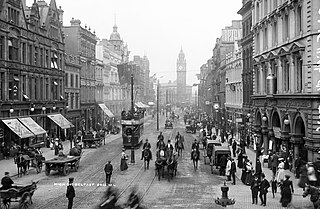
The history of Belfast as a settlement began during the Iron Age, while its status as a major urban centre originated in the 18th century. Belfast is the capital of Northern Ireland. Belfast was throughout its modern history a major commercial and industrial centre. In the late 20th century its traditional industries, particularly shipbuilding, declined. The city's history has been marked by violent conflict between Catholics and Protestants that caused many areas to split into Catholic and Protestant neighborhoods. In recent years, the city has been relatively peaceful and major redevelopment has occurred, especially in the inner city and dock areas.

Feeny is a village and townland in County Londonderry, Northern Ireland. It is between Dungiven and Claudy. In the 2011 Census it had a population of 690. Feeny lies just inside the boundary of the Sperrins Area of Outstanding Natural Beauty. It is situated within Causeway Coast and Glens district.
Murals in Northern Ireland have become symbols of Northern Ireland, depicting the region's past and present political and religious divisions.
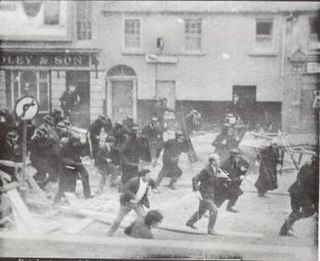
During 12–16 August 1969, there was an outbreak of political and sectarian violence throughout Northern Ireland, which is often seen as the beginning of the thirty-year conflict known as the Troubles. There had been sporadic violence throughout the year arising out of the Northern Ireland civil rights campaign, which demanded an end to discrimination against Catholics and Irish nationalists. Civil rights marches had been attacked by Protestant loyalists, and protesters often clashed with the Royal Ulster Constabulary (RUC), the overwhelmingly Protestant police force.
The culture of Belfast, much like the city, is a microcosm of the culture of Northern Ireland. Hilary McGrady, chief executive of Imagine Belfast, claimed that "Belfast has begun a social, economic and cultural transformation that has the potential to reverberate across Europe." Belfast is split between two rarely-overlapping vibrant cultural communities, a high-culture of opera, professional theatre, filmmaking and the visual arts and a more popular or commercial culture. Throughout the short years of troubles, Belfast tried to express itself through art and music.
This is a timeline of actions by the Ulster Defence Association (UDA), a loyalist paramilitary group formed in 1971. Most of these actions took place during the conflict known as "the Troubles" in Northern Ireland. The UDA's declared goal was to defend Loyalist areas from attack and to combat Irish republican paramilitaries. However, most of its victims were Irish Catholic civilians, who were often chosen at random.
References
- ↑ "Organization to Know: Irish Children's Fund". nwitimes.com. The Times of Northwest Indiana . Retrieved 2019-05-19.
- 1 2 "The Irish Children's Fund: Home". icfkids.org. Archived from the original on 4 June 2013.
- ↑ "Irish kids sample American pie - UPI Archives". United Press International. 1983-07-09. Retrieved 2019-05-19.
- ↑ "Hearts open to kids from Northern Ireland". Chicago Tribune. Retrieved 2019-05-19.
- ↑ "The Irish Children's Fund: History". icfkids.org. Archived from the original on 6 February 2012.